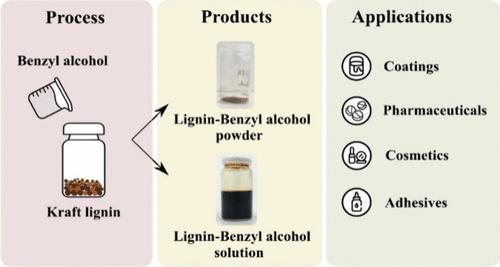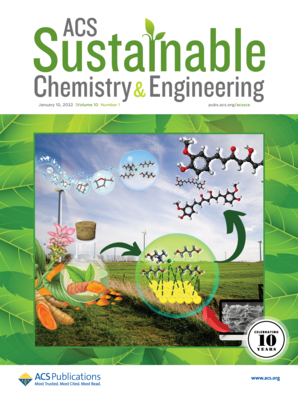IF 7.1
1区 化学
Q1 CHEMISTRY, MULTIDISCIPLINARY
引用次数: 0
摘要
木质素是一种丰富而复杂的芳香族生物聚合物,具有生产增值化学品和材料的巨大潜力。然而,木质素在普通有机溶剂中的溶解性限制了它的利用。在这项研究中,我们研究了软木牛皮纸木质素在苯甲醇中的溶解度,并将其与其他传统研究溶剂进行了比较。甲醇的木质素溶解度为 59%,而乙醇(18%)和丙酮(34%)由于烷基链较长且极性较低,对较大木质素片段的溶解效果较差。而苯甲醇则能完全溶解木质素,因此远远超过了标准溶剂的能力。此外,苄醇使木质素片段的分子量适中,为 3621 克/摩尔,多分散指数为 1.54。木质素在苯甲醇中的完全溶解性表明,高产率木质素分馏和随后的化学改性具有巨大潜力,而这对于木质素的价值化至关重要。尽管苄醇的沸点较高,但溶解度的提高有助于生产出反应位点增多的均质木质素馏分,从而拓宽了木质素在涂料和工业材料中的应用范围。本文章由计算机程序翻译,如有差异,请以英文原文为准。

Use of Benzyl Alcohol as a Solvent for Kraft Lignin
Lignin, an abundant and complex aromatic biopolymer, holds significant potential for producing value-added chemicals and materials. However, its utilization is limited by its solubility in common organic solvents. In this study, we investigated the solubility of softwood Kraft lignin in benzyl alcohol and compared it to other traditionally studied solvents. Methanol achieved a lignin solubility yield of 59%, while ethanol (18%) and acetone (34%), due to their longer alkyl chains and lower polarity, were less effective in solubilizing larger lignin fragments. Benzyl alcohol, on the other hand, exhibited a complete dissolution of lignin, thereby exceeding by far the capability of the standard solvents. Furthermore, benzyl alcohol resulted in a moderate molecular weight of 3621 g/mol for the lignin fragments and a narrow polydispersity index of 1.54. The complete solubility of lignin in benzyl alcohol suggests significant potential for high yield lignin fractionation and subsequent chemical modifications, which are essential for valorization. Despite the high boiling point of benzyl alcohol, the enhanced solubility could facilitate the production of homogeneous lignin fractions with increased reactive sites, thereby broadening the scope of lignin applications in coatings and industrial materials.
求助全文
通过发布文献求助,成功后即可免费获取论文全文。
去求助
来源期刊

ACS Sustainable Chemistry & Engineering
CHEMISTRY, MULTIDISCIPLINARY-ENGINEERING, CHEMICAL
CiteScore
13.80
自引率
4.80%
发文量
1470
审稿时长
1.7 months
期刊介绍:
ACS Sustainable Chemistry & Engineering is a prestigious weekly peer-reviewed scientific journal published by the American Chemical Society. Dedicated to advancing the principles of green chemistry and green engineering, it covers a wide array of research topics including green chemistry, green engineering, biomass, alternative energy, and life cycle assessment.
The journal welcomes submissions in various formats, including Letters, Articles, Features, and Perspectives (Reviews), that address the challenges of sustainability in the chemical enterprise and contribute to the advancement of sustainable practices. Join us in shaping the future of sustainable chemistry and engineering.
 求助内容:
求助内容: 应助结果提醒方式:
应助结果提醒方式:


